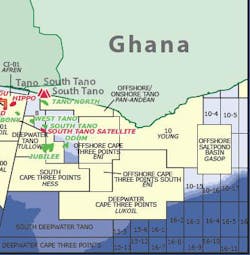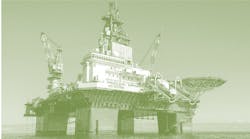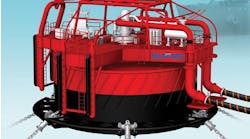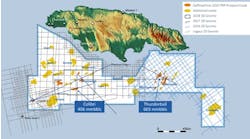Dr. Juliette Twumasi-Anokye
Petroleum Commission, Ghana
In 2007, Ghana made oil and gas discoveries in two deepwater blocks:West Cape Three Points and Deepwater Tano. These two discoveries that operate as the unitized Jubilee field are estimated to contain expected recoverable reserves of about 800 MMbbl of light crude oil, with an upside potential of about 1.8 Bbbl, as well as significant quantities of associated natural gas. Following the 2007 discoveries, further discoveries have been made off Ghana, which are being appraised and developed.
The potential impact of these discoveries on the Ghanaian economy has led to phenomenal interest in Ghana’s petroleum sector both locally and internationally. Amidst the excitement, the key development objective of the government of Ghana remains growth of the economy to accelerate development and industrialization. Since the oil and gas industry is proven to contribute significantly to strong growth in producing countries.
However, the discovery of oil in commercial quantities poses a number of challenges that must be addressed. Key of which is the need to establish a robust regulatory framework and institutional capacity in key areas of governance for effective management and oversight of the sector. This is because prudent management and policing of the sector has a significant impact on socio-economic development and the welfare of the producing state.
The Petroleum Commission, Ghana was created in response to these challenges. The Commission was established in accordance with Article 269 of the 1992 Constitution of Ghana, which provides for the establishment of commissions that will be responsible for the regulation and management of the utilization of the natural resources of Ghana, and the coordination of policies in relation to them.
Petroleum Commission, Ghana
Established in 2011 by the Petroleum Commission Act, Act 821, the Commission is the regulator for petroleum activities in Ghana. According to the act, petroleum activities “means any activity engaged in within and outside Ghana related to the exploration for, development and production of petroleum, the acquisition of data and drilling of wells and the treatment, storage, pipeline transportation and decommissioning and the planning, design, construction, installation, operation and use of any facility for the purpose of the activities.” Essentially, this makes the Commission the regulator of the upstream sector of the Ghanaian petroleum industry.
The Commission took over regulation of the sector from the Minister of Energy, who until then regulated the sector with the assistance of Ghana National Petroleum Corp. (GNPC). Act 821 specifically requires GNPC to cease to exercise any advisory function in relation to the regulation and management of the utilization of petroleum resources and the coordination of policies in relation to them six months after the passage of Act 821. This took effect on Jan. 16, 2012.
Functions
The Commission’s remit extends beyond that of any other regulatory body in Ghana. It is a supra-national regulator with diverse powers, which stem from its tripartite role. In addition to being a regulator in the technical sense, the Commission is also the manager of Ghana’s petroleum resources, and as coordinator of policies in relation to them, the Commission acts as the interface between the government and industry. Government agencies and departments are required to cooperate with the Commission.
Specifically, the functions of the Commission are to:
1. Promote planned, well executed, sustainable, and cost efficient petroleum activities to achieve optimal levels of resource exploitation for the overall benefit and welfare of citizens
2. Recommend to the Minister national policies related to petroleum activities
3. Monitor and ensure compliance with national policies, laws, regulations, and agreements related to petroleum activities
4. Ensure
- Compliance with health, safety, and environmental standards in petroleum activities in accordance with applicable laws, regulations, and agreements
- Optimum exploitation of petroleum resources
- Optimal utilization of existing and planned petroleum infrastructure
- Contractors, subcontractors, and other persons involved in petroleum activities comply with applicable laws and regulations
- Compliance with fiscal metering requirements in petroleum production activities in accordance with applicable laws and regulations.
5. Monitor petroleum activities and carry out the necessary inspection and audit related activities
6. Promote local content and local participation in petroleum activities as prescribed in the Petroleum Exploration and Production Act 1984 (PNDCL 84) and other applicable laws and regulations to strengthen national development
7. Receive and store petroleum data, manage a national petroleum repository and at the request of the Minister, undertake reconnaissance exploration including data acquisition
8. Receive applications and issue permits for specific petroleum activities as required under petroleum laws and regulations
9. Assess and approve appraisal programs
10. Advise the Minister on matters related to petroleum activities including:
- Field development plans
- Plans for the development of petroleum transportation, processing, and treatment facilities
- Decommissioning plans for petroleum fields and petroleum infrastructure.
11. Issue an annual public report on petroleum resources and activities in Ghana in accordance with the schedule to Act 821 and publish the report in the Gazette
12. Receive information from contractors as provided for under applicable laws and regulations
13. Analyze petroleum economic information and submit economic forecasts to on petroleum to the Minister
14. Perform any other function related to the object of the Commission or assigned to it under any enactment.
Governance
Act 821 prescribes the governance structure of the Commission, which comprises a CEO, chairperson, and board members, one of whom must be a woman. All of whom must be appointed by the president in accordance with Articles 70 and 195 of the Constitution. Other than the CEO, board members may not hold office for a period exceeding three years unless they are reappointed for a further term. Accordingly, on Nov. 24, 2011, the late president, Dr. John Evans Atta Mills, appointed the maiden governing body of the Commission to reflect the diversity of the Commission’s functions.
The board of the Commission is mandated to establish committees consisting of members of the board and/or of members and non-members of the board to enable it perform a function. Given the importance of local content and participation, and the fact that its promotion is one of the key functions of the Commission, the board is expected, under section 8 of Act 821, to establish a Local Content Committee (LCC). Local content is the maximization of value-addition and job creation, using local expertise, goods and services, businesses and financing in the oil and gas industry value chain, and the retention of benefits within Ghana.
Currently, legislative support for the government’s vision in relation to local content and local participation in the oil and gas sector is primarily found in PNDCL 84, which is the legal basis for petroleum agreements in Ghana. However, recognizing the importance of local content and participation to the sustainable development and the rapid acceleration of the development of the national economy as a whole, the government considers it crucial to enact specific legislation to address local content and participation.
Accordingly, a specific legislative instrument for the sector: Petroleum (Local Content and Local Participation in Petroleum Activities) Regulations (Local Content LI) will be presented to Parliament soon for deliberation and enactment.
The purpose of the Local Content LI is:
- Development of local content and local participation in all petroleum activities
- Require submission of a Ghanaian content plan and related sub-plans by licensees, contractors, and subcontractors with respect to:
- Provision of goods and services
- Technology transfer to Ghanaians
- Recruitment and training programs
3. Supervision, coordination, implementation, and monitoring of local content.
Offshore West Africa
The Commission is the key driver of local content and local participation in the oil and gas sector in Ghana. Its session atOffshore West Africa Conference & Exhibition March 19-21, in Accra, Ghana, will therefore set out its current activities geared toward development of local content. For instance, the Commission is responsible for overseeing the Local Content LI’s implementation, monitoring, and enforcement. The LCC established by the Commission will therefore play a crucial role in this regard. It will assist the Commission in supervision, coordination, administration, monitoring, management, and development of local content and local participation in the oil and gas sector as well as increasing capabilities and international competitiveness of indigenous Ghanaian businesses.
The session will also discuss the development of a Common Qualification System aimed at ensuring that all companies operating in the upstream sector are registered with the Commission, setting minimum standards for local content plans, evaluation of contracting strategy, and tender pre-qualification.



